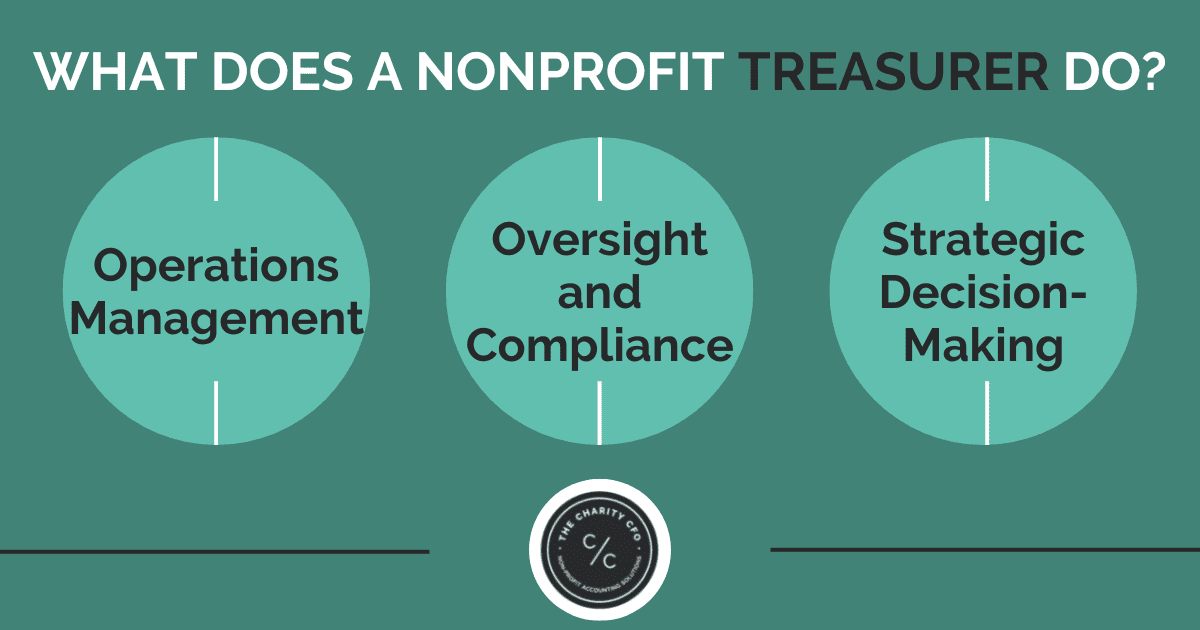Nonprofit treasurer duties: Where you should focus
Does your organization get bogged down with nonprofit treasurer duties?
Nonprofits don’t exist for the purpose of earning profits. With that being said, money is central to a nonprofit’s success. Salary costs and other administrative expenses are unavoidable. Also, there can be a lot of cash inflow from fundraising and grants, and it’s important to know how to use it.
How does a nonprofit manage its money? One of the most important board members for a nonprofit is the treasurer. The treasurer role encompasses a wide array of responsibilities, mainly concerning financial management and oversight.
You may be wondering what a treasurer can do for your nonprofit, or you may be interested in becoming a treasurer yourself. Read on to learn about a nonprofit treasurer’s duties.

What does a nonprofit treasurer do?
First things first: Treasurers aren’t accountants. A position to oversee finances may sound a lot like an accountant, but there are important distinctions between the two. Many nonprofits do not have in-house accountants and choose to outsource instead. The tasks of nonprofit accountants include more of the day-to-day bookkeeping tasks, while treasurers are more concerned with the bigger picture.
Tosha Anderson, CPA and CEO of The Charity CFO, discusses the do’s and don’ts of a treasurer in a recent episode of the “A Modern Nonprofit” Podcast.
The major tasks of a treasurer can be summed up as follows:
- Operations management
- Oversight and compliance
- Strategic decision-making
Operations management
The operational tasks of a treasurer concern financial management. These tasks include organizing financial data into helpful reports to be presented to the other board members. In addition to financial reporting and presentation, the day-to-day duties of a nonprofit treasurer may consist of signing checks, approving expenses, investing funds, paying bills, and so on. Some of the operational responsibilities of a nonprofit treasurer may overlap with that of the operations manager. However, the treasurer focuses more heavily on finance, while the operations manager has a broader scope of duties.
Oversight and compliance
In order for a nonprofit to be financially healthy, the right policies and procedures need to exist to guide financial duties. Potential oversight tasks could include establishing processes for budget review and selecting an auditor. Other important policies that should be in place are proper internal controls. These are measures put into place to guard your nonprofit’s assets and provide protection against any potential wrongdoings. Examples could be requiring two signatures on checks and maintaining a paper trail.
When discussing oversight responsibilities of a treasurer, Form 990 must be included. The IRS requires all nonprofits to submit this form each year. Form 990 is used to ensure that an organization meets the requirements for tax exemption by collecting a nonprofit’s financial data. The treasurer should make sure this form is submitted on time each year for compliance purposes.
Strategic decision-making
Above oversight are the even bigger-picture strategic duties. Strategy involves using financial data and reports to make sound decisions. Long-term financial planning is critical to the success of your nonprofit. A treasurer needs to look at financial options for meeting future goals, and they should ensure that the nonprofit’s finances are in line with the overall mission.
What are the qualifications for nonprofit treasurer duties?
As previously mentioned, a treasurer is not the same as an accountant. Treasurers may have a background in accounting, such as being a CPA or having education in nonprofit management, but this is not a requirement. A treasurer doesn’t need to have an accounting background, but they should be willing and capable of learning how to manage financial systems and reporting.
Other qualities that a treasurer should have are great communication skills, and even creativity. Treasurers aren’t just numbers people. They need to be able to clearly present the nonprofit’s finances to the rest of the board, so they should be clear communicators. Creativity is also a necessary trait when it comes to strategic decision-making. A treasurer should be someone who is willing to look at a variety of options from different angles to make well-informed choices.
A new treasurer can face a steep learning curve, especially if they do not have a background in accounting. Even for a treasurer who has worked in accounting or finance, there can be a lot to learn, since nonprofit finance is much different than that of for-profit companies. A nonprofit’s executive director and other board members should support the new treasurer as they get up to speed in their responsibilities. Without the support of others in leadership, a treasurer’s role can be very overwhelming at first.
Nonprofit Treasurer Duties: A Recap
The nonprofit treasurer is critical to the financial success of an organization. Duties include financial reporting, compliance, and financial strategy, although they are not involved in day-to-day bookkeeping tasks. Accounting tasks are either performed in-house or are outsourced.
It can be difficult at first for a treasurer to learn about all the duties that are part of their new role, but with support and guidance from other board members and leadership, a good treasurer can be the key to your nonprofit’s success.
Support for your nonprofit treasurer duties
If you are looking to add support and bandwidth to your nonprofit organization’s support staff, The Charity CFO is here to help. Contact us today for a free consultation on how we can serve your mission.







